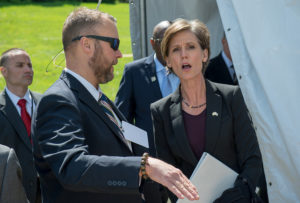
Sally Yates, then Deputy Attorney General, in 2016
Republicans in Congress perhaps exceeded even their own partisan reputation at yesterday’s hearing of the Senate Subcommittee on Crime and Terrorism entitled “Russian Interference in the 2016 United States Election.” The hearing featured Sally Yates, who was Acting Attorney General in the Trump administration until she was fired on January 30 of this year. Also appearing at the hearing was former Director of National Intelligence James Clapper. Each of these witnesses has decades of experience serving in the government under presidents of both parties, and both have knowledge about Russian efforts to interfere with the 2016 U.S. elections. For example, both witnesses know about Michael Flynn, a campaign advisor and then National Security Advisor under Donald Trump for just a few weeks, until February 13. Flynn, a principal subject of the hearing, was fired after the Washington Post reported that he lied about his telephone calls with Russian officials, including Russian Ambassador to the U.S. Sergey Kislyak, where the two discussed U.S. sanctions against Russia for interfering in the U.S. election that had just taken place. Yates testified at yesterday’s hearing that, in January of this year, she had urgent meetings and calls with Trump White House attorneys about Flynn, and that she recommended that action be taken regarding Flynn, because he was causing Vice President Mike Pence to lie to the American people about Flynn’s discussions with the Russians, and because Flynn was vulnerable to blackmail from Russia over his lies.
However, many of the Republican Senators on the panel did not seem to want to know about Russian involvement in our election. Instead, they criticized the “leaks” that led to the disclosure of Flynn’s activities, as well as the “unmasking” of Flynn. Part of what is shocking about the Republicans’ behavior at the hearing is that, had Flynn not been identified, he might still be National Security Advisor and would still be, as Yates explained, compromised by Russia.
Moreover, as Clapper testified on response to one Senator’s questions:
I understand how critical leaks are, and unmasking and all these ancillary issues, but to me, the transcendent issue here is the Russian interference in our election process, and what that means to the erosion of the fundamental fabric of our democracy, and that to me is a huge deal. And they’re going to continue to do it, and why not? It proved successful.
Some Republicans at the hearing criticized Sally Yates’ decision not to defend Donald Trump’s first Muslim Immigration Ban, which Yates (as well as the federal courts who ruled on it) determined was unconstitutional. Republican Senator Rafael “Ted” Cruz even implied that Yates had acted out of “partisanship,” even though she was appointed to the Justice Department under Republican President George H.W. Bush, and had served three Republican and two Democratic presidents. Since the Trump Muslim Ban had no bearing on the subject of the hearing, it can be seen as an attempt to impeach Yates.
The possible reason for such Republican attacks on Yates is that, as Clapper testified, the Intelligence Community Assessment (a joint report by the FBI, CIA and NSA undertaken in December 2016) found that Russia specifically worked to help Donald Trump and hurt Hillary Clinton, and Democratic Senators, at least, wanted to know about possible Trump campaign collusion with Russia. For example, Senator Patrick Leahy mentioned that, in addition to Flynn, U.S. Attorney General Jeff Sessions “misled” the Senate Judiciary Committee about his contacts with Russian officials as a Trump campaign representative, and Donald Trump’s son-in-law and senior advisor Jared Kushner failed to disclose contacts with Russian officials on his security clearance application.
Both Yates and Clapper stated, as did FBI Director James Comey at his Senate hearing last week, that they fully expect Russia to continue its U.S. election interference efforts, absent strong U.S. action to dissuade them. The question thus becomes whether Republicans will join the Democrats in a patriotic effort to stop Russian interference (which has been termed “cyber warfare”) against the U.S., or whether the GOP will merely act to cover up and protect Donald Trump.
Photo by U.S. Marshall Service, Office of Public Affairs, used under Creative Commons license. https://is.gd/roYelh


